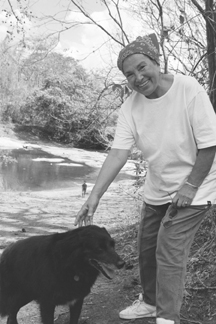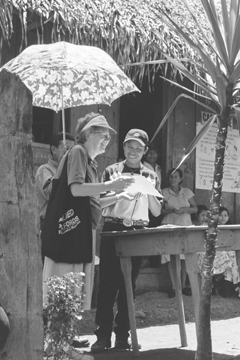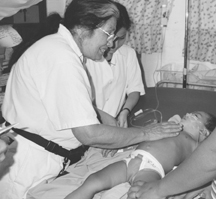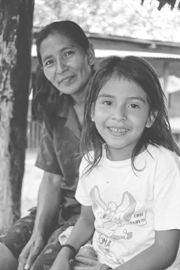¡Abrazos!
Winter Notes

Dear Friends,
Warmest greetings from all in the Clinic,
Legal Offices, girls in the shelter and from the men who
work with us.
It’s been a wet winter and the rain is
still falling with a vengeance. The last crops of beans and
corn were lost. Many poor homes on the riverbanks were
carried away. Malaria, dengue, diarrhea, respiratory
infections (especially pneumonia in young children) are all
on the rise. It’s hard to imagine, but the road from
Mulukuku to Rio Blanco is worse, with more sections just
gone. To get from here to there requires fearless and
creative driving.
NICARAGUA
TODAY
Noted in a recent NUEVO DIARIO article by
journalist, Ricardo Guerrero:
- The distance between rich and poor is growing daily
- In Nicaragua, the second poorest country in the
hemisphere, more than one-half the population survives on
less than $1 a day
- The multi-lateral debt has been forgiven, but where is
the money previously paid to the debt?
- New trade agreements, to remove barriers to imports,
will virtually destroy Nicaraguan production, especially
agricultural. Mexico’s experience with Free Trade has been
greater poverty.
INTERNATIONAL DAY OF THE RURAL
WOMAN
On October 15 more than 1,000 campesinas
gathered to express their needs. I was honored to address
the assembly. My message to the women was “ORGANIZE, DREAM,
SEEK ALLIES, AND WORK TO REALIZE YOUR DREAMS.”
Among the
most important issues of the women’s agenda: Recognition
that women contribute 50% to the economy; conditions of work
and pay that will allow a dignified life; safe working
conditions; food security and health care; and the right to
organize in businesses, farms, and
maquilas.
MERCEDES
Mercedes is 13 years old, and she
has been in our refuge for several months. She came to us
pregnant, after being raped. Her face shows no emotion; it’s
as though she were in a far away place. Because of her
immature body, she had a Cesarean Section and gave birth to
a girl. Mercedes and her baby are returning to her mother’s
home in the countryside. Mercedes’ mother, 35, appears 20
years older, and without hope. She holds her own newborn who
is the same age as her granddaughter.
I held Mercedes’
baby before she left the refuge. The baby is small but
healthy. I held in my arms a miracle; a perfect, beautiful
creature. What will her life be? Will she survive even the
first year? Will she be protected from rape when she is 13?
Can we make a difference, with programs for young people, to
help her life be better?

SPECIAL CLINIC NOTES
This year has
been especially busy with visitors who help with the daily
and special needs of the clinic. In January, doctors Connie
Adler and her husband, Mike, visited. Mike installed
emergency lights in the Treatment Room using solar panels.
Three special clinics were held. During one clinic to detect
tuberculosis, 13 new cases were discovered. We held two days
of medical consults in the remote community of Carazo, which
takes one full day by boat to reach. In May, we offered
medical consults to the “Mothers of Heroes and Martyrs” in
Matagalpa. The Galveston delegation again served and saved
lives. In July, two internationally known artists from
Solentime gave a two-week painting workshop to young
people.
In March, an exciting new initiative was
launched. Thirty Community Health Workers are learning human
rights, laws that protect women and children, mediation, and
primary health care. In cooperation with the University of
the Atlantic Coast and Caribbean (URACCAN) and Dr. Saul
Contraras of Doctors for Global Health, they will attend
classes for one week per month for a year, to prepare to
serve communities far from established services.
So,
Dear Friends, be strong and faithful to your dreams. You are
not engaged in charity, but in empowerment of the poorest of
the poor.
Abrazos,


Tenth Annual Appeal November,
2004
Dear Friends and Supporters,
A warm hello
to some of the most loyal supporters possible. While many of
you give year-round, this is the time we ask ourselves what
it means to us to be part of this community of workers and
supporters.
This clinic has defied the odds over the last
14 years, despite pervasive and deepening poverty in the
region, floods, washed out roads, and death threats. The
politically motivated government closure of the clinic,
which spurred huge national and international protests, lead
to the clinic re-opening.
In spite of the challenges,
what we see in Mulukuku is a vibrant community of workers
enlarging the spirit of hope in Nicaragua, where there is
far too little good news. You are central a player in the
dramas and successes that Dorothy reports about because poor
people cannot supply a medical clinic without outside help.
Women in Mulukuku have done the organizing and labor, and we
have the opportunity to be part of a historically
significant people’s project.
We invite you all again to
contribute to the success of the clinic, as fully as you
can, to bring stronger support to the clinic and its
outreach to even more remote villages.
The clinic staff
in Mulukuku continue to be amazed and moved by the support
it receive from kind strangers. Those of us in WEN extend
our thanks, knowing that even in one of the Americas’
poorest places, a powerful and beautiful community
organization for service exists and continues to be
supported by loyal friends.
Janie Yett, for the The
Women’s Empowerment Network
Please send your tax
deductible donations (Tax ID 77-0566997) payable
to:
Women’s Empowerment Network
309 Cedar Street,
#547
Santa Cruz, CA 95060

Liberia: A Nearby Village
Finds
Inspiration in Mulukuku

A half-day’s walk from Mulukuku is the tiny
community of Liberia, where people are noticeably more poor
and less healthy.
Liberia, like Mulukuku, is the creation
of impoverished refugees from the contra war, from both
sides of the conflict. While Mulukuku was built on land
donated by sympathetic ranchers (Noel and Grethel Sequiera)
the refugees of Liberia were squatting on land that belonged
to a bank.
Cecily Mills, of Edmonton, Canada, writes what
happened next:
 |
|
Cecily and the
mayor |
Dorothy mentioned in her newsletter that a group of
landless peasants settled on unoccupied land needed money to
buy the land. I offered what I had ($10,000) as down
payment.
Four years later, I joined Noel, in Liberia, in
front of the assembled community, who put on a festive
welcome to thank me, and many others in Mulukuku and
elsewhere. Noel recalled encouraging the community to stay
put on the land, to farm it, to build houses, to obtain
legal status as a collective, to petition the government to
grant them as ex-contra and ex-army fighters the land as
compensation. After countless trips to Managua, and reams of
paperwork, they have clear title to the land! Meanwhile,
they have drilled two wells, erected 34 latrines, built a
school, and engaged two teachers. There will be money left
over for an agricultural project, and hopefully some
reforestation. My money served as a catalyst for them to
make it through the long process and to begin their town.
What an honor for me to have been offered this role!
To
visit Liberia – proud, poor, and organized – was like a step
back in time to the early days of Mulukuku. People in
Liberia repeatedly spoke of the example and assistance of
Mulukuku. As the clinic in Mulukuku is more able to handle
its own local work, it is increasingly reaching out to more
distant communities like Liberia, which clinic staff now
visit on a regular basis.
Liberia is an example of what
communities can do for one another, as each shares its own
“wealth,” even in the midst of acute poverty, with others on
the path to a better future.

Longtime Supporter Visits
Mulukuku
By Julie Aguiar,
past President of WEN Board of
Directors, mother,
therapist, and social worker

Like so many of you who read this
newsletter, I’ve been supporting this project for many
years. My husband Victor and I started publishing
newsletters and managing the database in 1986. More
recently, we helped start Women’s Empowerment Network (WEN)
and have worked to develop fiscal stability.
This March,
I visited Nicaragua for the first time. It was a dream come
true to finally visit the “Centro de Mujeres Maria Luisa
Ortiz” and it’s biggest project, the clinic Dorothy
administers.
Being in Mulukuku, the place I have heard
about and imagined for so many years, was a profound
experience. It seemed familiar, like I had been there all
along, and, at the same time, new and surprising.
The
size of the project amazed me. The co-op and the clinic take
up a square block. Buildings encircle an open space, with
sitting areas, trees, and vegetable gardens. Simple,
well-planned buildings house the medical clinic, legal
offices, a shelter for girls and women who need protection,
a pharmacy, a large dormitory for visiting delegations, a
kitchen that feeds many people daily, an operating room, and
dental offices. A new radio tower broadcasts the programs
produced by the young people of Mulukuku, and a large garden
is nearby.
Another high point was meeting the Nicaraguan
women that I had heard about for years. The children of the
cooperative’s founders are now in their twenties, developing
their own expertise and leadership skills.
We met Deyling
Vazquez, a 19-year-old woman studying psychology. She
supports two younger siblings while she attends school.
Deyling wants to counsel women who have been sexually and
physically abused.
One young man, who has grown up in the
cooperative, rides his horse into the countryside to locate
women whose pap smears are positive and who need follow-up
treatment for cancer. He also brings to the clinic women who
are abused and want shelter. What remarkable work for a
young man.
I felt close to the women in Mulukuku,
noticing the ways in which we are similar. As mothers, we
share the way we care for our children, wanting them to be
happy and healthy. As people, we all want to do useful work
and to belong to a community.
This project is also
precious to me because I have been able to meet and work
with so many dedicated people here in Santa Cruz and
throughout the Americas and Europe. I’m so glad to be a part
of this work. I send a heartfelt thank you to all of you who
support this life-giving project.

Women’s
Empowerment Network Announcements
Money for
Medicines Needed
Dorothy has a special request from
clinic supporters.
Medicine supplies are low because of
increases in service to outlying communities. If you would
like to earmark a special donation for medicines, please
indicate this preference in the memo line on your
check.
We are grateful to two dedicated grant
writers, Rachel Nadelman of New York, and Susan Studebaker
of Texas. We will announce the results of their efforts in
upcoming newsletters.Their outreach efforts to new sources
of funding this year have been tireless.
THANKS!!
*
Please be sure to check out the photo
galleries at our
website:
www.peacehost.net/Dorothy
New links will be
added as we make more photos available.
Bank Fees are
on the Rise
If you live in Canada and would like to make
a donation, the clinic in Mulukuku will receive your full
donation if you donate in Canada rather than the U.S. Please
write Mulukuku in the memo line on your check and send
Canadian donations to:
Change for Children
#221,
9624-108 Ave
Edmonton, Alberta, Canada T5H
1A4
web:http://www.changeforchildren.org
*
In
Memorium
Two generous donations were made this fall in
honor of loved ones who passed away during the
year.
Cynthia Jordan honors her husband, Jim Lechtenberg,
and A.V. Coyle gives thanks for her mother, Shirley Kruc
Coyle.
Calling to the life-force in a
poisoned child
Sometimes the best medicine is the
language of the soul
by Janie
Yett , President of the WEN Board

Dorothy was speaking to our Santa Cruz
delegation in Mulukuku this March, presenting issues and
data about the clinic. Suddenly, I saw a different side of
Dorothy.
Several people burst into our meeting, asking
for Dorothy, saying two babies had been poisoned. I followed
them to the clinic. Two doctors were bent over the most
seriously poisoned child. Afraid he would die, they inserted
IV needles, checked eye dilation, and felt his pulse. The
stunned young mother wordlessly held the baby’s arm. While
she had been away that morning, her two youngsters had found
and eaten ant poison.
In turn, Dorothy started to work
with the most endangered toddler. She put her hand on the
baby’s belly, rubbing him, and calling out over and over (in
English!), “Hi, baby, good boy! Hi, baby, good
boy!”
It seemed to me that Dorothy was calling to his
soul. The boy’s
 |
|
For people who are willing and
able to make the trip, preventive care is available at
the clinic in
Mulukuku. |
body was flat and unmoving but something in him changed.
He looked at her steadily, like she was his life-line.
Unexpectedly, I found myself a witness to what seemed to be
a deeply spiritual moment of healing.
Later, when I
talked to Dorothy, she smiled at my observation, surprised
to have been noticed. “I believe there is something inside
of us all that wants to live,” she said, “And I was trying
to contact that desire in the baby.”
The boy was
transported to the nearest hospital. This child, who had
been at the edge of life, survived. I can’t say what role
Dorothy had in his survival, but I have a guess.
I
learned something about the healing power we all carry with
us. I also had a glimpse into an essential part of Dorothy’s
life.

